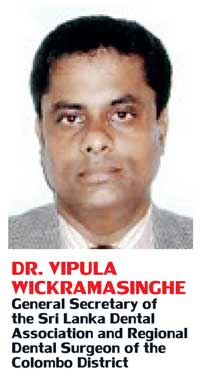Reply To:
Name - Reply Comment

“Oral health can be defined as the proper maintenance and hygiene of the mouth, including the teeth, tongue, oral mucus membrane, palate and the lips” says General Secretary of the Sri Lanka Dental Association and Regional Dental Surgeon of the Colombo District, Dr. Vipula Wickramasinghe. Stating that oral hygiene basically means a disease-free mouth,
Dr. Wickramasinghe explained the significance of maintaining good oral health from early childhood and preventing the formation of dental caries, gum disease and tooth decay from taking root in the oral cavity.
Importance and benefits of maintaining good oral health 
The mouth has several functions. The teeth and bones provide a good facial profile, given that you have a proper set of teeth and facial bones barring birth defects. A good facial profile thus enables one to have a good personality and helps enhance one’s self-confidence. “Maintaining good oral health is important in ensuring that your mouth is active because activity itself helps strengthen the facial muscles of an individual. For instance, an individual having fewer teeth may be prone to developing wrinkles in the long run. On the contrary, a proper set of teeth help maintain a proper muscle tone for the improvement of one’s facial profile including healthy facial growth; especially in children. A self-cleaning process of the mouth is also facilitated through the functions of the salivary glands when oral hygiene is well maintained. The tongue plays an equally important function and has taste buds that help identify taste; thus they must be cleaned properly daily. On the other hand, the entire digestive process commences with the oral cavity. Certain enzymes secreted from the mouth accompanied with proper chewing will help enhance the digestion of food. Additionally, a good set of teeth plays a crucial role in one’s ability to pronounce words properly. These are some important advantages of maintaining good oral health” Dr. Wickramasinghe added.
In order to achieve these benefits, it is vital that we inculcate and maintain good oral habits. Stating that the oral health of a mother is very important, Dr. Wickramasinghe said that this applies even during pregnancy. If good oral hygiene is not practiced during pregnancy, it could imply that the mother is a carrier of harmful bacteria in her mouth.
“Since the mother is the first to kiss and feed the baby, there is a high potential for the direct transmission of harmful bacteria from mother to child if the mother doesn’t maintain good oral hygiene. Bacteria can accumulate inside the baby’s mouth and can lead to diseases once the teeth start emerging. Therefore, proper oral hygiene during pregnancy is mandatory for expectant mothers.
During the first trimester of pregnancy, most mothers experience morning sickness. Thus, in order to counteract the acidities that could be present in the mouth and to maintain the hygiene of the mouth, it is pivotal to brush one’s teeth and clean their tongue in the aftermath of morning sickness. Since mothers consume a lot of intermittent food as part of their cravings during pregnancy, the chances of food particles accumulating in the mouth are higher than under usual circumstances. Brushing teeth after the intake of intermittent food is thus essential. Throughout the pregnancy there will be many hormonal changes including pregnancy diabetes. Such conditions could give rise to side-effects such as gum problems. Researchers point to a scientific relationship between gum disease and low birth rates in babies. Therefore, a mother has to take adequate measures during the pregnancy period with regard to her well-being in order to deliver a healthy baby” he said.
How to maintain good oral health and prevent tooth decay
Following the first six months after the birth of an infant, one can observe the lower teeth emerging in a baby’s mouth. Therefore, from the start, it is important that a baby’s teeth are cleaned properly. When the number of teeth increases by three or four, a toothbrush with soft filament must be used to clean the teeth of a baby, Dr. Wickramasinghe advised.
Highlighting that a mother’s milk would not result in tooth decay in a child’s mouth, he said that when a child was introduced to powdered/ artificial milk, it was always advisable to use a minimum level of sugar for the preparation of milk in order to prevent tooth decay. Adding that it is not advisable to bottle feed milk during the night, Dr. Wickramasinghe said any solidified milk particles present in the milk could be deposited in the teeth, giving rise to tooth decay. This is commonly known as ‘Feeding Bottle Syndrome’ where tooth decay occurs as a result of using a feeding bottle; since solidified particles get deposited in the teeth, whereas only the liquid filters into the mouth through the teeth.
Since the first permanent teeth appear around the age of six years leading to a set of 28 teeth by the age of approximately thirteen, it is important that children be trained to take proper care of their teeth from a very early age. By the age of 18-21, young adults will have 32 teeth in their mouth, although in some cases delays could occur depending on individual growth spurts. Since new teeth could contain a lot of grooves, they should be brushed properly to prevent the formation of cavities.
Giving a few tips on how to maintain good oral health, Dr. Wickramasinghe said it was advisable to discourage children from becoming addicted to sweets and instead encouraging them to consume more fruits and vegetables. While brushing teeth at least twice a day with a fluoridated toothpaste is vital in preventing the accumulation of bacteria in the mouth, it is always recommended to brush teeth after consuming the main meals of the day. Starting from the age of five-six and after, it is always advisable to visit dentists for a dental checkup every six months. Proper chewing of food is also equally important, as it helps the digestive process in addition to help toning the facial muscles. He also advised that carbonated drinks/fizzy drinks containing sugar should be avoided as much as possible since they could erode teeth by damaging the enamel layer in the inner part of teeth, leading to cavities and sensitivities. In the event of any discolouration of the teeth or if you notice blood while brushing the teeth, it is advisable to seek immediate medical attention.